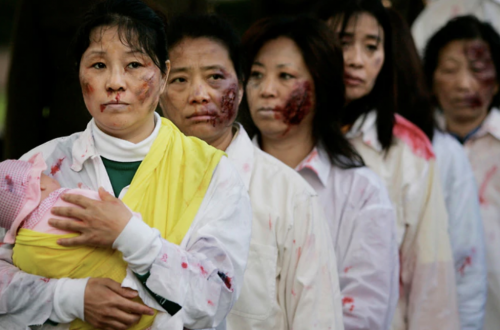Tahir ul-Qadri is a Pakistani Barlevi (and, therefore, Sufi) jurist who founded and heads the Minhaj ul Quran Foundation which has a minor following and some dozen mosques in the UK. Last year, I noted he had issued issuing a fatwa against such suicide terrorism, and was vaguely pleased.
Although I had not then heard of him, the idea of any Islamic jurist with Government approval and support (which he does have) promoting an argument against such murderous violence seemed welcome. What sticks in my craw about the official initiatives over the past decade and a half to open lines of communication with observant Muslims is a mixture of ignorance of and wilful blindness to statements and beliefs which are wholly incompatible with life in an inclusive, liberal democracy.
If a quietist group wishes to withdraw from a sinful world and for the members to elect to live according to restrictive social mores, that should be their own affair. What has been objectionable is the accommodation – and considerable state funding – giving to self-appointed community gatekeepers who extended their intolerance to other groups.
Reasoning for Government support being re-directed to groups such as MuQ is that they stand in contrast to other interest groups such as the Muslim Council of Britain or individuals such as Daoud “You Sunk My Navy” Abdullah whose evasive statements in English – and not so evasive statements in other languages – point to a support for extreme violence against minority groups and civilians.
Although Qadri leads a numerically small following in the UK, anything which countered the above is to be welcomed. Immediately, alas, I had suspicions as, from excerpts of his 600 page fatwa, he appeared to oppose firstly the killing of innocent civilians (my emphasis).
What about guilty civilians?
Furthermore, he sought to placate nervous Western observers by insisting:
Every Salafi and Deobandi is not a terrorist but I have no hesitation in saying that everyone is a well-wisher of terrorists and this has not been appreciated by the Western governments or support for attacks on civilians.
Setting aside the question of routine support for terrorism amongst Salafis and Deobandis, Qadri appears to be saying that both are non-Sunni and have common cause against his iteration of Islam. In fact, the Deobandi iteration is generally recognized as Sunni, and rooted in the Hanafi school and Sufism (and would be distrusted by austere Salafis for that reason).
Okay, so much, so disputable. Surely Qadri’s heart is the right place? A few days ago, an approving piece was posted on HP by Hasan Afzal of Stand for Peace who had welcomed Qadri at a recent event.
In response, Joseph K made a series of comments which indicate that my above assessment was being hideously optimistic, not least on Qadri’s intimate involvement in the 1980s with Pakistan’s blasphemy laws. A piece celebrating his petitions to the Federal Sharia Court of Pakistan – which imposed, amongst other examples of legislation, the imposition of the death penalty for blasphemy and reintroduction of stoning to death as a form of punishment – previously was present on the MuQ website through this. It still is present in Google Cache.
Specific effects of the blasphemy laws was the banning of Ahmadiyya worship. Abdul Hamid al Manchesteri at the Spittoon discussed the blocking of an Admadiyya mosque in Walsall by other local Muslims. It would be instructive to know what Qadri’s thoughts on this were.
Qadri addressed a conference at Georgetown University on 8 November 2010, as seen in this YouTube recording.
At 2 min 49 sec, Qadri responds to an Anglican clergyman’s stated concerns of the misuse… sorry… use of blasphemy laws against Pakistani Christians:
There is nothing wrong as far as the substantive law is concerned… the wrong that we see is only in the adjective and procedural aspect of the law.
Suspicions that he is saying the problem is not the potential for punishment for blasphemy – be it capital or otherwise – but a corrupt Police would appear to be confirmed at 5 min 27 sec he repeats:
There is no problem with the law itself. Some amendments, according to me, are necessarily required in procedural law.
I know for a fact that Hasan Afzal was unaware of and now is aghast at this history. Another organizer in contact with the MuQ was told of an unspecified involvement with the formulation of the blasphemy laws, but was assured by that it had been misrepresented by a third party.
Not meaning to sound t-o-o-o-o-o cynical, this mispresentation/mistranslation line has been used elsewhere, and this other individual admits that MuQ has declined to issue a public statement.
I would hope that Qadri’s views have softened over the years. What sticks in my craw, however, about the official initiatives over the past decade and a half to open lines of communication with observant Muslims is a mixture of ignorance of and wilful blindness to statements and beliefs which are wholly incompatible with life in an inclusive, liberal democracy.


